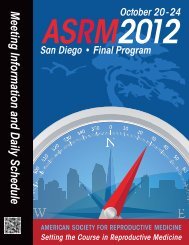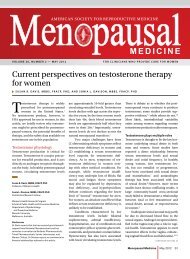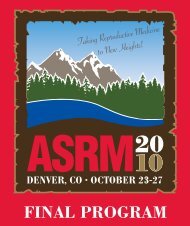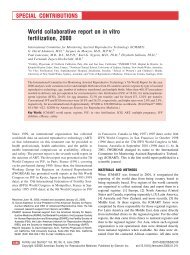scientific program • symposia - American Society for Reproductive ...
scientific program • symposia - American Society for Reproductive ...
scientific program • symposia - American Society for Reproductive ...
You also want an ePaper? Increase the reach of your titles
YUMPU automatically turns print PDFs into web optimized ePapers that Google loves.
SCIENTIFIC PROGRAM <strong>•</strong> SYMPOSIA<br />
Monday, October 17, 2011 11:15 am – 1:00 pm<br />
Symposium<br />
TWO MOMS, TWO DADS: SAME SEX COUPLES AND<br />
ASSISTED REPRODUCTION<br />
Presented by the Mental Health Professional Group<br />
Dorothy A. Greenfeld, L.C.S.W. (Chair)<br />
Yale University School of Medicine<br />
Kim E. Bergman, Ph.D.<br />
Fertility Counseling Services, Inc.<br />
Emre Seli, M.D.<br />
Yale University School of Medicine<br />
Needs Assessment and Description<br />
Same sex couples increasingly seek assistance from<br />
fertility treatment centers in order to become parents. This<br />
symposium will increase participants’ understanding of<br />
social, psychological and medical issues unique to gay men<br />
and lesbians as they embark on creating a family. Myths<br />
and misconceptions about gay men and lesbians and their<br />
children and what the research reveals about these families<br />
will be explored.<br />
Learning Objectives<br />
At the conclusion of this session, participants should be able<br />
to:<br />
1. Summarize research on the well-being of same sex<br />
couples and their children conceived through assisted<br />
Room 224 A/B<br />
reproduction.<br />
2. Discuss treatment options <strong>for</strong> lesbians and gay men<br />
seeking parenthood through assisted reproduction.<br />
3. Describe psychological support and counseling<br />
issues unique to lesbians and gay men seeking assisted<br />
reproduction.<br />
65<br />
ACGME COMPETENCY<br />
Medical Knowledge<br />
Patient Care<br />
Interpersonal and Communication Skills<br />
TEST QUESTION:<br />
A 61-year-old woman wishes to begin building her family.<br />
After participating in this session, at the initial consultation<br />
with this patient, I will:<br />
A. Discuss the medical risks of pregnancy and the<br />
psychosocial and emotional impacts of ovum donation<br />
and non-genetic parenting.<br />
B. Per<strong>for</strong>m standardized psychological testing prior to any<br />
counseling.<br />
C. Recommend the woman pursue ovum donation.<br />
D. Recommend the woman pursue adoption.<br />
E. Not applicable to my area of practice.<br />
Monday, October 17, 2011 11:15 am – 1:00 pm<br />
Symposium<br />
Room 224 C/D<br />
WEIGHT AND FERTILITY: THE MULTIFACTORIAL CHALLENGES<br />
Presented by the Nurses’ Professional Group<br />
Monica E. Moore, N.P. (Chair)<br />
<strong>Reproductive</strong> Medicine Fertility Center of Connecticut<br />
Angela C. Thyer, M.D.<br />
Seattle <strong>Reproductive</strong> Medicine<br />
Judy D. Simon, B.S., M.S., R.D.<br />
University of Washington Medical Center<br />
Needs Assessment and Description<br />
Either extreme in weight can hinder reproductive and<br />
maternal outcomes. There are data that a body mass<br />
index (BMI) > 35 kg/m 2 can have a negative impact on<br />
IVF success rates and that obesity increases complications<br />
during pregnancy. Since approximately one third of all<br />
adults are either overweight or obese, this seminar will<br />
focus mainly on strategies to counsel and treat overweight<br />
patients desiring pregnancy. Research shows that the<br />
best outcomes are as a result of an interdisciplinary,<br />
comprehensive and integrated approach. Providers need<br />
to feel com<strong>for</strong>table discussing weight with their patients,<br />
and reproductive endocrinology centers should have<br />
mechanisms in place to help patients attain a healthy<br />
weight.<br />
Learning Objectives<br />
At the conclusion of this session, participants should be able<br />
to:<br />
1. Explain how low or high BMIs can negatively impact a<br />
couple’s chance to conceive.<br />
2. Consider the importance of a specialized nutritionist.<br />
3. Formulate strategies within your practice that identify<br />
over- or underweight patients, without bias, and assist<br />
them in achieving a healthy weight.<br />
ACGME COMPETENCY<br />
Medical Knowledge<br />
Patient Care<br />
Interpersonal and Communication Skills<br />
TEST QUESTION:<br />
After participating in this session, I will do the following in my<br />
practice:<br />
A. Counsel all patients with regard to a healthy weight.<br />
B. Counsel patients only if they have a BMI>30 kg/m 2 .<br />
C. Counsel patients only if they have a BMI>35 kg/m 2 .<br />
D. Not counsel patients about weight at all.<br />
E. Not applicable to my area of practice.








